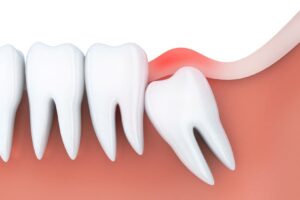 If it seems like many people you know, including yourself, have issues with wisdom teeth, you’re not imagining it. Most people experience the eruption of their third set of molars between the ages of 15 and 25. Although wisdom teeth were once essential for grinding and chewing tough foods, they no longer serve a purpose because of new cooking and food processing methods. As a result, human jaws have narrowed throughout time, which is why many people don’t have enough space to accommodate another set of molars. It’s common for wisdom teeth to need to be removed from impaction because they can grow in sideways, and here’s why.
If it seems like many people you know, including yourself, have issues with wisdom teeth, you’re not imagining it. Most people experience the eruption of their third set of molars between the ages of 15 and 25. Although wisdom teeth were once essential for grinding and chewing tough foods, they no longer serve a purpose because of new cooking and food processing methods. As a result, human jaws have narrowed throughout time, which is why many people don’t have enough space to accommodate another set of molars. It’s common for wisdom teeth to need to be removed from impaction because they can grow in sideways, and here’s why.
Common Wisdom Tooth Problems
With narrower jaws, many people just don’t have enough space for their wisdom teeth to erupt correctly. It’s not unusual for the third molars to cause overcrowding, infections, and pain. Once or more wisdom teeth can also be fully or partially impacted, which means they are trapped below the gums or in the bone. It’s also common for wisdom teeth to grow in horizontally.
When a tooth is situated parallel to the jawbone, it is known as a horizontal impaction. It is unable to break through the gums, which is why you may not even be aware your wisdom tooth isn’t vertical. It isn’t until having a dental X-ray that impacted teeth are found.
Complications of a Sideways Tooth
Although you may not see the tooth from the surface, it can wreak havoc on your dental health while lying hidden below your gums. Here are just a few complications of not having the tooth extracted:
- Damage to Surrounding Teeth: Your surrounding teeth can be at risk of decay, overcrowding, infections, and damage that may not be repairable.
- Pain: Pain and inflammation are common symptoms of an impacted wisdom tooth.
- Potential Pericoronitis: Some patients develop gum flaps, which can result in pain, swelling, and bleeding.
- Periodontal Disease: Impacted wisdom teeth can make it difficult to keep them clean, which can lead to an infection called gum disease. Not only is it a leading cause of tooth loss, but it can also harm your overall wellness.
- Cysts: Untreated cysts can damage your jawbone and increase the risk of tumor formation.
Removing Horizontal Wisdom Teeth
You can avoid dental health complications by having your wisdom teeth removed. Horizontal wisdom teeth often require surgical extraction. Your oral surgeon will use sedation or anesthesia to keep you comfortable as your gum tissue is opened and your tooth is removed. Your gums will be sutured closed and your mouth will be healed in about 1-2 weeks. Your dentist will explain exactly what you can expect along the way.
About Dr. JD Hansen
Dr. Hansen achieved his dental degree at the University of Louisville and has completed additional training in implant dentistry, cosmetics, and wisdom teeth. If you need a wisdom tooth consultation, request an appointment online or call his office at (801) 683-6698.
